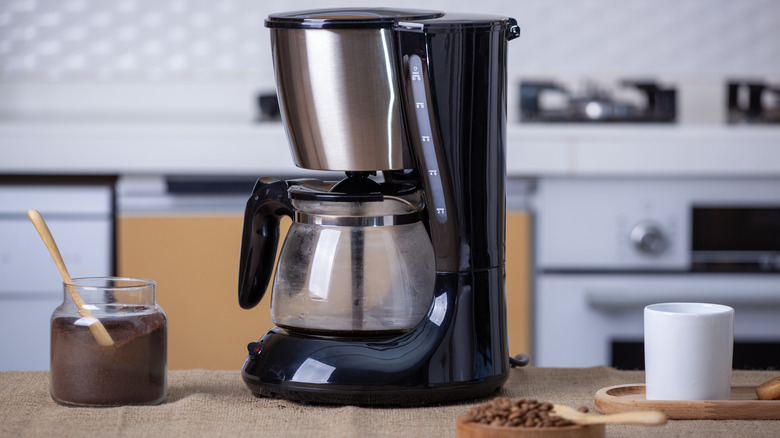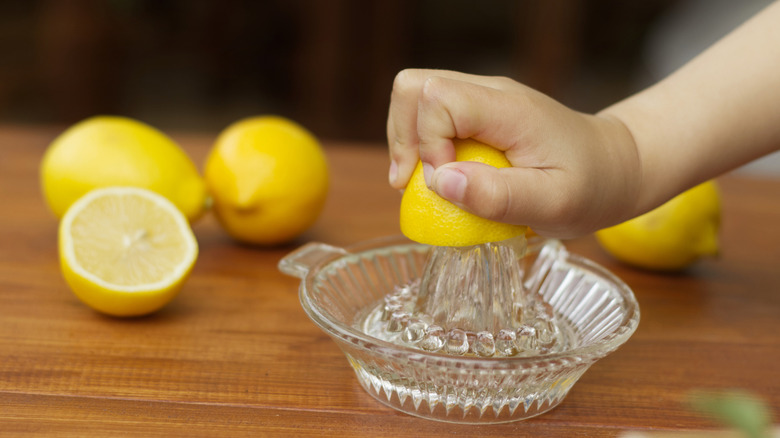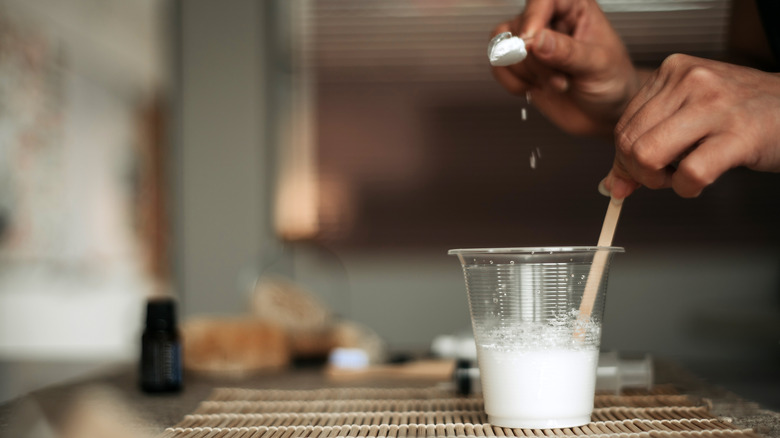Ditch The Vinegar When Cleaning Your Coffee Machine & Try This Trick Instead
While vinegar is often used to clean coffee makers, there are compelling reasons to reconsider this household staple. The strong acetic acid in vinegar can sometimes linger in your machine long after rinsing. This can add unwanted flavors to your morning coffee. Over time, repeated vinegar use can degrade rubber seals and hoses in some machines, potentially shortening their lifespan and requiring you to buy a new coffee maker. Vinegar is not particularly effective against oily coffee residue as well. These oils can build up in your brew basket and are one of the biggest factors that affect your coffee's taste. Luckily, there are many alternatives that not only clean the machine effectively but are also gentler on the overall health of your coffee maker.
The best alternatives should be able to tackle all aspects of cleaning your coffee machine, dissolving mineral deposits, breaking down oil residue, and sanitizing without any chemical aftertaste. Options range from classics like baking soda to specialized tablets designed specifically for cleaning, and the most popular, lemon juice. Unlike vinegar, these alternatives typically clean just as effectively without leaving behind odors that require multiple cleaning cycles. Making the switch away from vinegar will help provide you with better-tasting coffee and potentially longer life for your morning brew machine.
The benefits of using lemon juice instead of vinegar
Fresh lemon juice stands as one of the most effective natural alternatives to vinegar for coffee machine maintenance. The citric acid in lemons dissolves mineral deposits just as effectively as vinegar, but without any of the persistent odors. It also naturally helps break down coffee oils that vinegar can leave behind. You'll want to mix equal parts lemon juice and water to fill your machine's reservoir, then run a basic brew cycle. Let it go through completely and then run two clear water cycles to clean out the machine. Mild acidity will act as a natural sanitizer against bacteria and mold that can easily develop in damp coffee makers. You can also use the lemon peels to clean the coffee pot, and they will leave behind a fresh citrus scent as opposed to vinegar's sour leftovers.
Lemon juice does have its limitations though. It works best on a machine that is only slightly dirty. If yours has heavy mineral buildup, you may want to consider something stronger or multiple treatments. The natural sugars in lemon juice means you will want to be thorough with the rinse cycles to prevent any sticky residue. You might even want to follow the lemon treatment with a baking soda rinse to neutralize remaining acidity. While lemon juice is generally safe for most coffee makers, check your manufacturer's recommendations, as some high-end machines require specific cleaning solutions. When used properly, however, lemon juice can deliver a deep clean without degrading your machine's components or your coffee's flavor.
Other vinegar-free coffee machine cleaning solutions
There are plenty of easy ways to clean your coffee maker, and if you are trying to find something beyond vinegar or lemon juice, there are a few effective methods. Baking soda makes an excellent cleaner for removable parts like carafes and brew baskets. You can make a baking soda cleaning paste by mixing it with a small amount of water and scrubbing it into the dirty parts. Denture tablets dissolved in water can also run through the brewing cycle and are surprisingly effective at breaking down oils and sanitizing your coffee machine. There is also commercial cleaning tablets specially formulated to tackle mineral deposits and oils without any aftertaste, though these can be a bit more expensive.
After a good deep cleaning, it is important to keep up regular maintenance on your machine. Always empty and rinse the coffee pot and basket immediately after use to help prevent buildup. Also, run a weekly clean water cycle to flush the system regularly. For pod machines, be sure to clean the piercing needle often to prevent clogs. Regardless of what deep cleaning method you choose, always finish with some fresh water cycles to make sure nothing is left behind. These methods, and regular cleanings, will help keep your coffee tasting its best and extend the life of your coffee maker beyond what vinegar cleaning alone could do.


